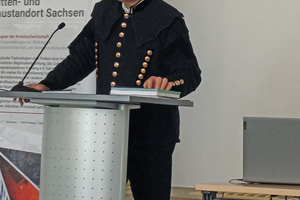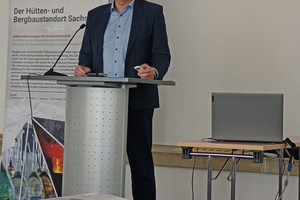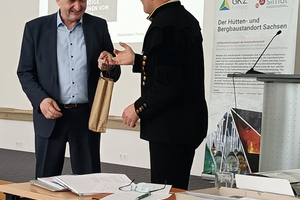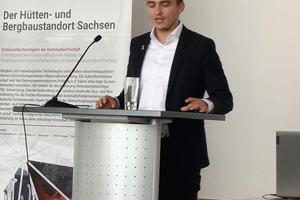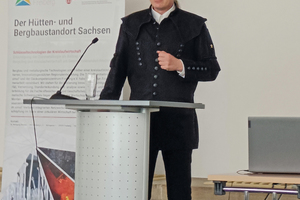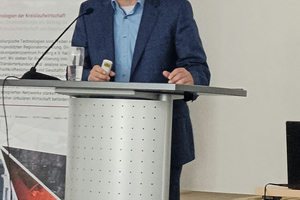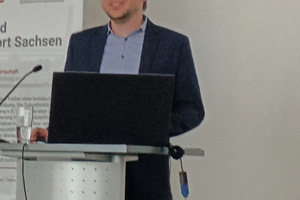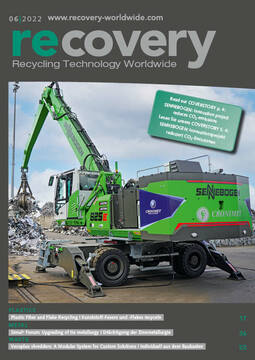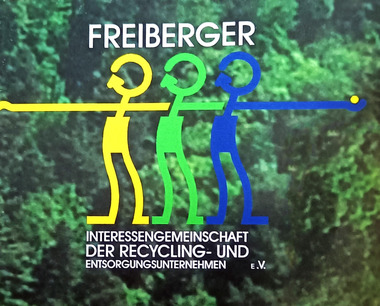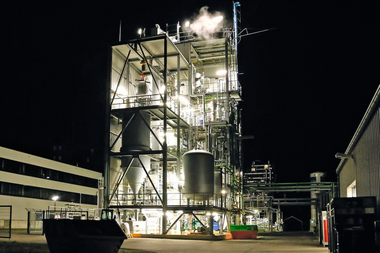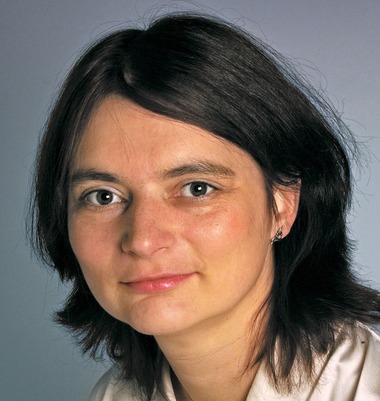Upgrading of tin metallurgy as a contribution to recycling and circular economy at the geomontane site Freiberg/Saxony
Under the leadership of the GKZ Geokompetenzzentrum Freiberg, the final conference of the future initiative simul+ took place in Freiberg on May 23, 2022. Under the motto „Bringing the future together“, the Saxon State Ministry for Regional Development launched this initiative six years ago as a platform for innovation-based regional development and for networking regional players. Since then, the range of topics has expanded greatly.
On the initiative of the GKZ, Feinhütte Halsbrücke GmbH, the Institute for Non-Ferrous Metallurgy and High-Purity Materials, as well as the Institute for Processing Machines and Recycling Systems Technology of the TU Bergakademie Freiberg, SAXORE Bergbau GmbH and POWPRO GmbH, Dresden joined forces and jointly invited to this final conference.
Forty invited guests were expected, 51 had come, Dr. Wolfgang Reimer was pleased in his welcome and introduction to the project, because this testifies to the great interest in the subject. „The purpose of the simul+ forum,“ continued Dr. Reimer, „is to inform people about the objectives of the project at the interface between research and practice and to encourage other potential cooperation partners to join in.“ In this context, he said, the political bodies are an important group, since many things are decided and achieved by political means. A big plus for the circular economy in Saxony are the many smelters, recycling companies and research institutes. Saxony can thus make an important contribution to the security of supply of raw materials. Dr. Reimer explained why tin in particular was chosen as the topic for the conference, citing the increasing importance of this metal. All future technologies will need this material (electromobility, energy turnaround) and the corresponding competence is concentrated in Freiberg and Saxony (deposits, smelters, recycling plants, research). Dr. Reimer again emphasized that the circular economy must be integrated into regional development. In this respect, Minister of State Thomas Schmidt, Saxon Ministry for Regional Development was given a particularly warm welcome by Dr. Reimann.
In his remarks on the „Objectives and contribution of the simul+ future initiative to Saxony as a metallurgical and mining location, Minister of State Schmidt particularly emphasized the tasks of his ministry as a driving force: „Securing resources will play an increasingly important role, not only in Saxony and Germany, but also in the EU." The goals must be to strengthen regional value creation, remove obstacles to development and improve cooperation between science and industry. Numerous challenges have to be mastered, e.g. political framework conditions (EU taxonomy), creation of more resilient supply chains, securing skilled labor, structural change in many industries, digitalization, and many more. The risks and weaknesses that arise in the process are numerous but surmountable, for example, lack of acceptance and hostility to industry among the population, changes in job profiles and working environments, as well as changing consumer behavior and migration. The minister noted as a shortcoming that Saxony‘s multipliers are poorly represented in EU bodies and highlighted the Freiberg CCZ as a positive example.
The simul+ initiative is based on three pillars:
Knowledge transfer (through forums and workshops to achieve networking).
Participation fund for citizens and associations
Model projects (with the aim of improving living conditions)
Finally, Minister Schmidt appealed to the participants of the conference to join the initiative, because it is worth it. 50 000 € are available within simul+ for circular economy and regional value creation.
Value chain of the coal and steel industry in the context of the circular economy at the Geomontan site Freiberg
Two presentations from industry were given under this theme. „Ways of recycling tin and lead at the Freiberg geomontane site“ was presented by Tobias Patzig, GF Feinhütte Halsbrücke GmbH, Halsbrücke. The company is a pure secondary raw materials company and is dedicated to the recycling and upcycling of tin and lead as well as the accompanying elements Ag, Au, Ni, In, Sb, Ge, Cu, etc. The technological process consists mainly of thermal treatment (short drum furnace), refining and electrolysis. The product portfolio is very extensive, for example solder wires for the electronics sector. There is close cooperation with research institutions, in particular the TU BAF Freiberg. The total annual production is 16 000 t with a large production depth and breadth and a turnover of € 58 million. The depth of added value is estimated to be unique (Sn: 99.99 %). The company is certified according to various standards and pursues various future projects (www.green-tin.de), practices nature conservation at the site (self-supply of energy through state-of-the-art photovoltaic system, pelletization of dusts, planting of trees). The managing director drew a very negative scenario for the future of German industry due to the so-called supply chain law, the shortage of skilled workers and the corona pandemic, which has still not been fully resolved. Addressing the politicians, whom he accused of hostility to industry and overly high bureaucratic hurdles, he concluded by saying, „A ‚ban‘ on natural gas would be devastating, because without natural gas there are no green nonferrous metals.“
Representing the company involved in the revival of mining in the Ore Mountains, Dr. Marco Roscher, Saxore Bergbau GmbH, presented the „Prospects of backward integration in the tin, indium, zinc sector from the mining perspective“ and addressed the challenges and opportunities. First, he explained the status of the permits for the „Tellerhäuser“ project, which includes the Hämmerlein and Tellerhäuser (Dreibein and Zweibach) deposit parts and represents one of the most important tin resources in the world. Saxore Bergbau GmbH submitted an application according to §8 BBergG in November 2019, which was approved in August 2020, so that mining can start soon. Dr. Roscher further reported on investigations of bulk samples from the Pöhla visitor mine (located north of the above-mentioned permit field) with Sn contents of up to 1...2 %. Primarily in cooperation with UVR-FIA GmbH Freiberg, a process master tree was developed using 130 t of material and proof was provided that a cassiterite concentrate can be obtained which can be smelted after a purification stage. A feasibility study including a cost analysis is currently being prepared. The implementation on a technical scale is a great challenge due to the current high price increases (concrete currently by 700 %!). It is advantageous that the entire cluster is available in Germany, i.e. the deposits, the research, the processing and the smelting. In conclusion, Dr. Roscher once again summarized the opportunities offered by this mining work:
Contribution to securing raw materials in Germany and Europe
New ore mining in Central Europe to the highest standards (lighthouse project)
Integrated value chains in Saxony
Increasing acceptance for new mining in Saxony
Creation of prospects for skilled workers in mining
Participation in the structural change from fossil to sustainable energies
Applied research
Under this heading, Dr. Henning Morgenroth, GF UVR-FIA GmbH, Freiberg, first spoke on the topic of „Closing value chains: Processing methods for indigenous raw materials up to marketability“. The company has been conducting applied research for decades and represents a link between science and technology. The main focus is on processing and recycling. Pilot plants up to approx. 1t/h are available for this purpose. From the many contract works from a colorful range of primary and secondary raw materials, the following are examples: Fluorspar and barite, copper slate, lithium mica, tin stone, electronic and battery scrap or industrial slags. Recent cooperation partners are, as already described above, Saxore Bergbau GmbH for the processing of skarn complex ore from the Tellerhäuser deposit (together with 25 other universities, institutions and companies from 8 European countries with the involvement of the GKZ) or Deutsche Lithium GmbH, Freiberg, for which a process for the processing of lithium mica was developed. Dr. Morgenroth sees the intention of the neighbouring Helmholtz Institute Freiberg (HIF) to take over the technical center of UVR-FIA GmbH and convert it into a „Flexi-Plant“ in the next few years as problematic. A concept for the private company UVR-FIA GmbH is not foreseen by the state-owned HIF, so that the future of UVR-FIA GmbH is very much in question if the working basis for applied research and development, process development and test operation in pilot plants is thereby eliminated. Dr. Morgenroth therefore appealed to everyone to work to ensure that the cooperation with HIF is structured in such a way that the applied research of UVR-FIA GmbH can continue.
„Practical research at the Institute for Non-Ferrous Metallurgy and High-Purity Materials (INEMET)“ was presented by Prof. Alexandros Charitos, INEMR of TU BA Freiberg. Material research focuses on ashes and slags using hydrogen as fuel and reducing agent. Process focuses include pyrolysis and electrolysis of molten salts as well as hydro- and electrometallurgy, but research objects also include digitalization and thermochemical modeling. Prof. Charitos discussed individual projects, for example Cu slag (recovery of pig iron and glass fiber), fly ash (recovery of building materials and chemicals), Nd2O3 from EoL-NdFeB magnets (recovery of Nd). Research is also being carried out in the field of tin; in addition to the classic pyrometallurgical process, attention is being devoted to hydrometallurgical Sn extraction, which could eventually be supplemented by electrolysis. In summary, INEMET plans strategic research in the areas of
Circular economy
Residual materials EoL- products (slags, ashes)
Magnet and battery recycling (NdFeB/ LFP)
Recycling of PGM materials (Ir, Pt, Pd, from H2-PEMEC catalysts)
Decarbonization of metallurgical industry (use of inert anodes in Al production; use of H2 as fuel and reducing agent)
Sensor technology and digitalization in metallurgy
In the last contribution, Dr. Stefan Jäckel introduced the Landesverband Recyclingwirtschaft Sachsen (120 members), which was formed in 1993 in Dresden and of which he is the managing director. The association laments the shortage of skilled workers, especially in the field of technicians, master craftsmen and skilled workers. But the area of professional drivers is also extremely problematic. The reasons are complex (low response to tenders, wage demands are rising inexorably, many potential applicants are oriented towards better earning and development opportunities and professions in which the balance between work and private life is more balanced. Advertising and education campaigns for the needed job profiles are urgently needed.
Summary
As a conclusion of the event, Dr. Reimer once again emphasized the importance of cooperation and collaboration, which is necessary to ensure the securing of raw materials taking into account the circular economy and sustainability in Germany and Europe. Saxony offers the best conditions to build up a comprehensive value chain of the mining industry and to promote the circular economy at the geomontane site Freiberg. Unfortunately, the GKZ is not an industry association, a shortcoming especially in eastern Germany. Although the structure of the Geocompetence Center is good, the membership lacks industrial companies in particular, which are urgently needed for the implementation of research and development. Too little is seen of the opportunities in participating in this center. Dr. Reimer took the opportunity to again promote membership in the GKZ. But his words were also addressed to the decision makers in politics, who should use the opportunity to show the importance of applied research in the coal and steel industry and make it accessible to European financial support.

